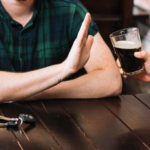By Lauren DeSouza- Master of Public Health, Simon Fraser Public Research University – Canada
https://cshmke.com/our-team/
Staff Research and Content Writer
© Copyright – SUD RECOVERY CENTERS – A Division of Genesis Behavioral Services, Inc., Milwaukee, Wisconsin – April 2023 – All rights reserved.
Quitting smoking is rarely easy for anyone. It can take as many as 30 attempts for someone to quit smoking for good. Nicotine is one of the most addictive substances in the world, more addictive than cocaine, heroin, and alcohol. Many who have quit multiple substances say that tobacco is the hardest to quit. Unfortunately, quitting smoking is much harder for those who consume other substances alongside tobacco. This is especially true for those who drink alcohol regularly alongside tobacco use.
In a new study, researchers from the University of Amsterdam reviewed existing literature on alcohol use and smoking cessation to understand better how alcohol consumption affects attempts to quit smoking. Specifically, the study aimed to determine the mechanisms through which alcohol impairs smoking cessation and to inform future research and treatment options for those who drink and want to quit smoking
What is the connection between tobacco and alcohol?
Smoking and drinking often go hand in hand. People may smoke socially on a night out at a bar or pub or smoke while having a drink to unwind after a long day at work. People who smoke are more likely to drink and drink more heavily than people who do not smoke. In the US, 86% of people who smoke also drink alcohol. Smoking is particularly prevalent among those who drink heavily, defined as five drinks or more per day; many people diagnosed with alcohol use disorder are also tobacco-dependent. Some studies suggest that 90% of people with alcohol use disorder also smoke.

Image via Freepik
Unfortunately, drinking alcohol before or during an attempt to quit smoking is one of the most common reasons that smoking cessation attempts fail. Experts often recommend that people trying to quit smoking avoid alcohol for the first few weeks, as it can trigger an intense craving for a cigarette. Quitting smoking can temporarily heighten stress and tension, and alcohol is known anecdotally to reduce tension, which may be one reason why people drink more when trying to quit smoking. In addition, tobacco addiction is as much a behavioral addiction as a physiological addiction. For those who drink and smoke concurrently, such as in social situations, drinking becomes near-impossible without the addition of a cigarette.
What did this study do?
In this study, the authors systematically reviewed existing literature on alcohol consumption in people who smoked. The review included naturalistic (observational) and experimental studies published up until August 2022. To be included, studies had to include at least 40 tobacco smokers with a recorded drinking status whose alcohol consumption changed during the study. The researchers were interested in the effects of alcohol on the following factors: smoking quit rates, smoking lapse and relapse rates, the proportion of relapsers vs. sustained quitters, and self-reported temptation and rates of slip-ups to smoke.
Naturalistic studies observed people who both drink and smoke over a long period of time to see the natural effects of drinking on smoking cessation. Experimental studies looked either at the effects of alcohol use during quit-smoking attempts or at the impact of alcohol use on participants’ beliefs that they could successfully quit smoking.
A total of 60 studies covering over 400,000 participants were included in the final review.
What were the main findings?
Overall, this review found that those who do not drink are much more likely to quit smoking successfully than those who drink. In 20 out of 27 studies with quit rates as a main outcome, alcohol use was associated with lower rates of quitting smoking. This relationship is dose-dependent, meaning that a higher level of alcohol use leads to a lower level of smoking cessation. In addition, those who drink occasionally or not at all make more quit-smoking attempts than those who drink heavily, suggesting that drinking may hold people back from wanting to quit smoking. Interestingly, in a couple of studies, the negative effect of drinking on smoking quit attempts was seen in men but not in women.
Alcohol use was also found to be strongly associated with lapses in smoking abstinence. In 19 out of 20 long-term follow-up studies, those with high alcohol consumption who quit smoking quit for a shorter time than those who did not drink. In fact, heavy drinking doubled the risk of a smoking relapse. Similarly, these studies indicated a strong relationship between alcohol use and cravings to smoke. 12 out of 13 experimental studies showed that being exposed to alcohol cues induced a strong urge to smoke among people trying to quit. For example, those who drank even at moderate levels were less able to resist smoking after drinking alcohol.
Finally, this review found variance in the relationship between one’s alcohol consumption and their self-belief in their ability to quit smoking. Many people associated alcohol use with barriers to smoking cessation, including stress and feeling less in control of their moods. However, those with a higher baseline level of alcohol consumption had more confidence in their ability to quit smoking successfully.

Image via Freepik
What are the key takeaways?
The findings from this review demonstrate the various ways that drinking, especially heavy drinking, can impair one’s ability to quit smoking. Drinking makes it less likely that one will make an attempt to quit smoking and increases the risk of smoking relapse. Therefore, the authors recommend that those who drink alcohol and intend to quit smoking use an integrated approach where they stop or substantially reduce their alcohol intake before and during their quit-smoking attempt.
There is also evidence for integrated treatment approaches that address tobacco and alcohol use concurrently. For example, a smoking cessation treatment that included a brief alcohol intervention to reduce consumption during the quit period was found to significantly increase smoking abstinence. The authors recommend that those trying to quit smoking who have a history of (or currently struggle with) alcohol use disorder are referred to specialist programs to help them quit smoking. Integrated tobacco and alcohol cessation programs may also be feasible for this population.
References
Jan van Amsterdam, Wim van den Brink, The effect of alcohol use on smoking cessation: A systematic review, Alcohol, Volume 109, 2023, Pages 13-22.
Shiffman S, Balabanis M, Do Drinking and Smoking Go Together? Alcohol Health Res World, 1996;20(2):107-110. PMID: 31798093; PMCID: PMC6876501
